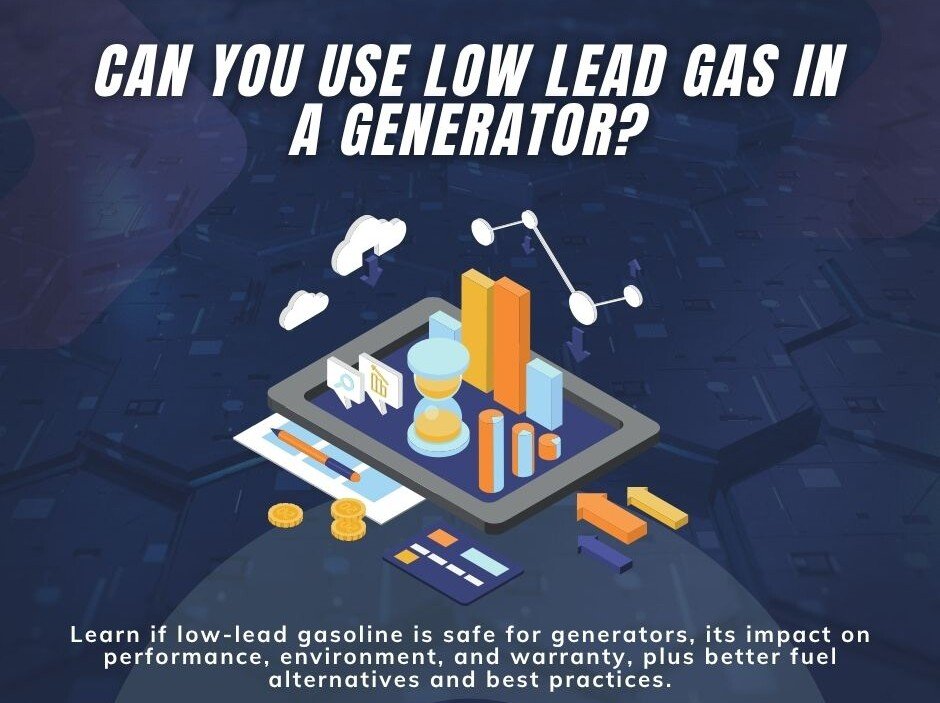Generators provide, for many of us, our only source of backup electricity during outages, power for equipment on remote job sites, and fuel for outdoor adventures. As such, one particular user query is that of low-lead gasoline: Can I use it in a generator and get good results? Understanding the reasons why this is so can save both money and mechanical headaches, and can also help to protect our environment.
Understanding Low Lead Gasoline
To begin with, it’s essential to understand what low-lead gasoline is. With its environmental and health concerns, leaded gasoline (also known as regular gasoline and just unleaded petroleum in many places) has caused most vehicles and other modern machinery to be run off unleaded gas.
By comparison, low-lead gasoline has only traces of lead in it, which is used to improve engine lubrication and stop knocking in older engines. Although leaded gasoline may have been totally phased out in many areas, low-lead gas forms are still available ingredients. In particular, they are used in specialized engines like those found aboard older aircraft or vintage cars.
However, low-lead gas is highly regulated and its compatibility with modern equipment, including generators, is often misunderstood.
Fuel Type Is a Serious Issue for Generators
Generators supply power through an internal combustion engine that is tied to a fuel source. And these engines are designed typically for a particular kind of fuel. Using the wrong kind can mean loss in efficiency, damaging engine parts, and long-term wear on the engine itself.
Modern generators for the most part use unleaded gasoline with an octane rating of 87 or higher. In some cases, the seller recommends that you use a higher octane gas rating of 91 or 93 depending on their power needs for peak performance.
What of low-lead gas? This will vary greatly depending upon the design of the engine in which it’s being used and other specifications given by manufacturers.
So, Can Low-Lead Gasoline Be Used In Your Generator?
The short answer to this question is no—for most modern generators, low-lead gas should not be used. There are some good reasons why:
Compatibility with Engines
Modern generators are designed for unleaded gasoline. Use of low-lead gasoline can introduce lead into the engine. This becomes a hazard for spark plugs, oxygen sensors, catalytic converters, etc. Over time, reduced performance and damage to expensive components may result. Leakage of flammable gases from these inner areas could potentially cause fire/explosion hazards due to fumes combining with heat sources during the combustion process.
Environmental Issues
The primary reason for phasing out leaded gasoline was its harmful environmental impact. Lead is a toxic substance that can contaminate the air, water, and soil. Using low-lead gas means continuing these environmental abuses—still a concern even with reform efforts on pollutants.
Warranty Breakages
According to the instructions of many manufacturers, using fuel containing high levels of lead in your generator will cancel its warranty. If after using low-lead gas you have troubles with gasoline smell or other performance problems, then expect to have to pay for all the costs personally.
Accessibility Issues
Low-lead gas is difficult to come by and, depending on location, may even be illegal outside specific uses (like in aircraft). This limitation makes it an impractical choice for daily generator use.
Situations Where Low-Lead Gasoline May Be Used
Even though it is not recommended for modern generators, there could be some rare occasions where low-lead gas would be appropriate:
Old Generators
If you own an old model generator that was specifically designed to run on leaded or low-lead gasoline, it is possible that you could use such a product. Nonetheless, these types are increasingly rare, and for such cases it is best to consult the manufacturer or a qualified mechanic.
Emergency Solutions
If you find yourself in an emergency where no other fuel is available, a small amount of low-lead gas might help keep your generator running for a short time. It’s worth noting that this could cause problems, though, and should only be regarded as a last resort.
Best Practices for Fueling Your Generator
To keep your generator running efficiently and prevent needless damage, follow these best practices for fueling:
Use the Appropriate Fuel
Always refer to your generator’s owner’s manual for the type of fuel it requires. For most modern generators, this will be gasoline without lead with an octane rating over 87.
Avoid Blends with Heavy Ethanol
Gasoline blended with a lot of ethanol (more than 10%) can damage your generator motor by rusting it. Instead, whenever possible choose non-ethanol or low-ethanol fuel.
Store Gas Rightly
Over time gasoline degrades. This may cause starting problems and result in deposits in the fuel system. If you will be storing gasoline for a long period, use fuel stabilizers to extend its life.
Maintenance on a Regular Basis
Maintaining your generator in good condition demands regular maintenance, such as replacing parts like spark plugs and filters. Proper care will mean that your generator stays efficient and reliable.
Occasional Use of Premium Fuels
If you depend on your generator for critical operations, consider using a high-grade unleaded gasoline from reputable suppliers. Its higher octane rating can help ensure smoother operation, even under rigorous conditions.
Looking for Alternatives
If you’re in the market for fuels for your generator that go beyond standard unleaded gasoline, here are a few possibilities you might consider:
Propane
A clean-burning fuel option which is widely used among many dual-fuel generators is propane. It can be stored for the long term without deteriorating and, unlike gasoline, is eco-friendly.
Natural Gas
Natural gas generators are the distance a professional racer needs from fuel stations. They draw fuel constantly by plugging directly into a utility line, so there is never any need to refuel them.
Solar-Powered Generators
Though not a direct substitute for fuel-powered systems, solar generators have recently started to come into their own. Featuring cleaner and indoor operation since they don’t require fuel, this is why they are also being used by more people than ever before as an alternative for powering off-grid or residential systems.
Make the Right Choice for Smooth Operation
Fuels for generators have to be chosen well if the efficiency, working lifetime, or fault-free service is possible with our investment. Although we may be tempted by low-lead gas occasionally in some circumstances, it’s a very large risk far outweighing any possible advantages to modern equipment.
Instead, use good quality regular unleaded fuel and keep your generator maintained right: you will get the most out of it that way.
Need Expert Help?
Looking for assistance in keeping your generator running or choosing the right fuel for it? Please feel free to leave a message or contact our expert team today so that every situation can be covered with reliable power.








What is a Lead Magnet in Digital Marketing and Why Does It Matter?
Mastering Advantages Business Marketing
Do Lead Generation Companies Need Google My Business?
Do Bandit Signs Work for Generation of Leads